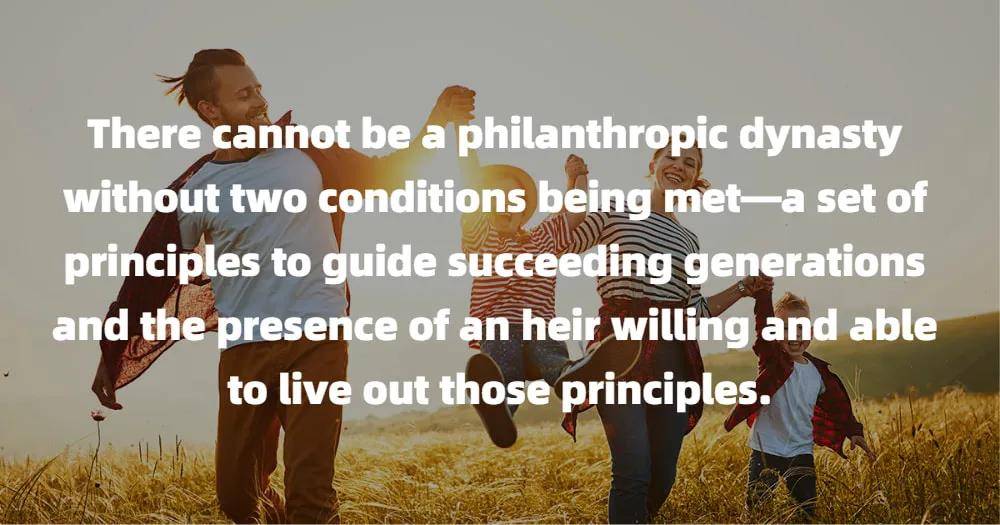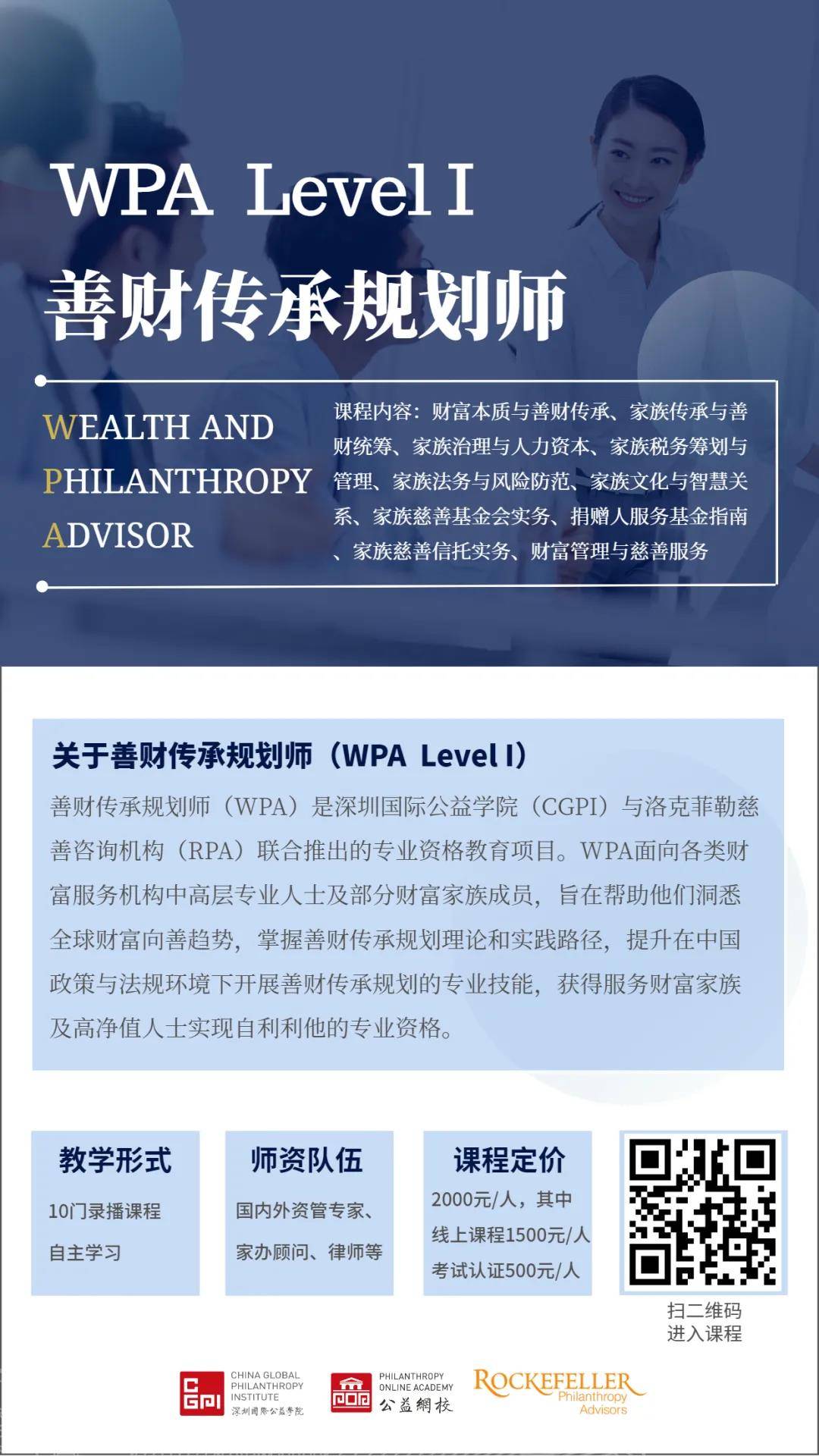"
“家族价值观”这个词曾经承载着强烈的政治、宗教和情感包袱。幸运的是,最初那些高度紧张的修辞已经让位于更深入、更具建设性和普遍性的对话:是什么塑造了一个家族的特质,并激励着爱的传承?它叙述的即使不是家族共同的结果,也是共同的经历。
最近几年,围绕财富代际转移、新富一代、捐赠传统、税收与个人慈善激励、社会责任的争论有越来越多的争论,也许没有哪个群体比那些关心私人慈善事业未来的人更应该参与到家族价值观的讨论中来。
家族如何激发并塑造价值观——尤其是给予的价值观——以及这些价值观如何代代相传,是确保未来慈善事业健康发展的关键因素。
为了研究这种价值观的转移是如何发生的,我们可以提出两种假设:
-
家族自身的特质影响着个人价值观和整个家族价值观的形成;
-
就家族的个人和共同价值观进行对话具有内在的价值。

塑造家族价值观
SHAPING FAMILY VALUES
家族是如何形成个别成员的价值观和整个家族的价值观的?想想一个家族是如何体现因果理论的——一个相互关联的网络,成员在情感和心理安全以及功能和教育发展方面相互依赖。几个原则:
家族是一个系统。
对于生物学、心理治疗和组织管理等不同领域来说,系统性理解已经是进行了几十年的研究。在其系统思考和组织学习的著作中,彼得·圣吉(PeterSenge)将系统描述为“一个能感知到的整体,它的各个元素‘结合在一起’,因为它们随着时间的推移不断地相互影响,并朝着一个共同的目标运行。”凯林·格西克(Kelin Gersick), 伊万·兰斯伯格(Ivan Lansberg)等探索了家族制度是如何影响着家族企业的发展和事业成功。
在努力了解如何以最佳方式开展有效的家族慈善事业方面迈出了重要的一步之后,他们的注意力已经转向这些系统和“生命周期”如何影响家族基金会的组织发展。
凯林·格西克,成长于美国伊利诺伊州一个家族企业,曾在哈佛大学和耶鲁大学执教及从事家族企业与家族治理研究。他曾撰写过有关家族企业、家族基金会、接班人培养等方面的文章,并著有《代代相传:家族企业发展模型》、《代代慈善:家族基金会的领导与延续》。
伊万·兰斯伯格,美国西北大学凯洛格商学院家族企业研究中心学术主任,家族企业领域的全球领军人物之一。曾任耶鲁大学管理学院家族企业与组织行为学教授、《家族企业评论》(Family Business Review)创刊主编及家族企业学会(Family Firm Institute)联合创始人。
系统是相互依存的。
家族不仅仅指成员发展的背景。家族成员简单叠加也不会产生系统。如果说系统的第一个原则是整体性,那么第二个原则就是关系。
正是由于人与人关系的独特性,如何反应和互动,才使得个性得以显现。因此,不同的个体可能是同一个家族的产物。人类是非常社会化的生物,我们对自我的认知和对家族的认知是相互依存的。
相互依存可以导致可预测的行为模式。
正如我们拥有的遗产是进化中的,它产生了各种人类功能,我们也拥有影响自身行为的情感遗产。情感上的相互依赖越强烈,行为模式的可预测性就越强。有什么相互依赖的关系比家族纽带更富有情感呢?
相互依存是多代人的。
当你疑虑为下一代慈善家做的准备是不是太多的时候,想想我们之间的相互依赖远远超出了我们的核心家庭关系。虽然最强烈的情感纽带显然与核心家庭有关,但我们的行为和价值观受到了我们的前辈的影响,也会影响许多后代。
丹·汉密尔顿(Dan Hamilton)是哈里斯及伊丽莎·肯普纳基金会(Harris and Eliza Kempner Fund)的顾问委员会成员,也是肯普纳基金会创始人的曾孙。汉密尔顿家中的壁炉上挂满了他祖父、曾祖父、曾叔父和其他祖辈的照片,可以追溯到他曾祖母哈蒂那一代(建立慈善世家的八个先辈之一)。

家族关系和活动的质量取决于我们的动机。
也许没有哪个美国家族像洛克菲勒家族那样,代表了慈善事业深厚、多代相传的传统。在试图了解“洛克菲勒的良知”(Rockefeller Conscience)是如何在数代人的传承里发展和维持,约翰·恩索·哈尔(John Ensor Harr)和彼得·约翰逊(Peter Johnson)驳斥了这样的论断:内疚或公共关系可能是老洛克菲勒和小洛克菲勒早期捐赠的动机。
虽然这些动机可能会驱动一次慈善行为,甚至驱动个人一生的捐赠,但它们不足以使这一传统长期、世代相传下去。
“如果不满足以下两个条件,就不可能建立慈善世家——一套指导后世的原则,以及一个愿意并能够实践这些原则的继承人。就洛克菲勒夫妇而言,父亲的道德价值观无所不在……小洛克菲勒并不是盲目地执行父亲的意愿,而是以极大的决心和独创性发扬了这些愿望的精神。”(《洛克菲勒的良知》The Rockefeller Conscience,1991)

小洛克菲勒和他的妻子艾比·奥尔德里奇·洛克菲勒虽然养育了性格和兴趣迥异的孩子,但他们却将“洛克菲勒家族传统的价值观念……非常好地灌输给了儿子们。每个儿子在成长过程中……都被灌输了强烈的家族意识,并决心以某种形式的公共服务为社会做出贡献。”
与许多现在到了第三代或第四代的慈善家族一样,洛克菲勒捐赠的悠久传统最早的动机是:热爱家族;尊重他人;服务的价值;以及虔诚的宗教信仰。

家族系统的原则:对价值观和慈善事业的影响
PRINCIPLES OF FAMILY SYSTEMS: IMPACT ON VALUES AND PHILANTHROPY
-
家族是一个系统。家族系统影响着家族慈善事业的发展和成功。
- 系统是相互依存的。家族系统是家族内部各种纽带关系相互作用的结果。
- 相互依存可以导致可预测的行为模式。情感上的相互依赖越强烈,行为模式就越可预测。
- 相互依存是多代人的。行为和价值观是由前几代人塑造,同时我们也在影响着后代的传承。
- 家族关系和活动的质量取决于动机。这些动机包括:对家族的热爱;对他人的尊重;服务的价值;以及虔诚的信仰。

课程推荐
善财传承规划师(Wealth and Philanthropy Advisor, WPA)是深圳国际公益学院(CGPI)与洛克菲勒慈善咨询机构(RPA)联合推出的专业资格教育项目。本项目将带领学员洞悉全球财富向善趋势,掌握善财传承规划理论和实践路径,提升在中国政策与法规环境下开展善财传承规划的专业技能,具备服务财富家族及高净值人士实现自利利他的专业资格。课程收获
1.通过系统学习,掌握善财传承规划专业知识
洞悉全球财富向善前沿趋势;理解并贴合高净值客户需求;提升国内善财规划专业技能;延伸自身业务的深度和广度;实现超高净值客户传承需求。
2.CGPI 和 RPA 联合颁发专业证书
完成课程学习后,若参加并通过相应测试,按照要求提交申请,通过审核可获得深圳国际公益学院与洛克菲勒慈善咨询机构联合颁发的WPA Level I 证书。
3.优先参与“善财传承规划师”项目线上线下主题活动
Family Values, Family Philanthropy (Ⅰ)
NCFP Could it be that the phrase “family values” once carried such intense political, religious, and emotional baggage? Fortunately, the highly charged rhetoric of those first confrontations has given way to deeper, more richly provocative conversations. The very phrase that polarized now often connotes that which we hope is most universal: the nurturing and loving heritage that inspires and shapes our values and ideals. It speaks to shared experiences if not common results.With increasing speculation on the generational transfer of wealth, the new wealthy, multicultural giving traditions, tax versus personal charitable incentives, and the debate over the social responsibility of government, perhaps no group should be more engaged in the family values discussion than those who care about the future of private philanthropy.How families inspire and shape values—particularly the value of giving— and how those are passed from one generation to another, are critical elements in ensuring a healthy charitable future.To begin to examine how this transfer of values takes place, two presumptions might be made: that families by their very nature influence the shaping of individual values as well as the values of the entire family; and that there is intrinsic value in having conversations about the personal and shared values of the family.Shaping Family ValuesHow do families contribute to shaping the values of the individual members as well as the values of the whole family? Consider how a family embodies the cause and effect theory—an interconnected network with members dependent on one another for emotional and psychological security as well as for their functional and educational development. A few principles:Families are systems. Understanding systems has been a decades-long endeavor for fields as diverse as biology, psychotherapy, and organizational management. In his work in systems thinking and organizational learning, Peter Senge describes a system as “a perceived whole whose elements‘hang together’ because they continually affect each other over time and operate toward a common purpose.” Kelin Gersick, Ivan Lansberg, and others have explored how family systems influence the development and success of family businesses. In an important step forward in efforts to understand how effective family philanthropy can best take place, their attention has turned to how these systems and “life cycles” are influencing the organizational development of family foundations.Systems are interdependent. Families aren’t just the backdrops for our development. Nor do family members added together produce the system. If the first principle of systems is wholeness, the second relationships. The family system is the result of the interaction among the connecting relationships. It is in the distinctiveness of our personal relationships, how we react and interact, that our individuality emerges.Consequently, very different individuals can be products of the same family. We humans are very social creatures and our image of self and image of family are reciprocal and interdependent.Interdependence can result in predictable patterns of behavior. As we have an evolutionary heritage that has produced all kinds of human functioning, so too do we have an emotional heritage that influences our behavior. The more intense the emotional interdependence, the more predictable the patterns of behavior. What interdependent relationship is more emotional than the bonds of family?Interdependence is multi-generational. Just when you're tempted to think that too much is made of preparing for a new generation of philanthropists, consider that our interdependence goes far beyond our nuclear family. While the strongest emotional bonds are clearly with the nuclear family, our behavior and values have been shaped by the generations that preceded us just as we will influence many successive generations.Dan Hamilton is an advisory committee member of the Harris and Eliza Kempner Fund and great great grandson of the Fund’s namesakes.The mantle of Hamilton’s home is filled with photographs of his grandfather, great-grandfather, great uncles and other relatives dating back to his great-grandmother Hattie’s generation (one of the eight children who founded the philanthropic dynasty). “It is important to establish roots in the center of my home that grounds me in the history, values, and outlooks of those who have come before me. When I think about my values, I know I’m not reinventing the wheel. I can look to my grandfather, for example, and find a shared love of family and education. I have a history that is a part of me. My mom used a family tree to informally tell stories about the different family members. She used their family nicknames and anecdotes to help us develop connections to those who might have been faceless identities otherwise.”The quality of our family relationships and activities depends on what motivates us. Perhaps no American family has come to represent the deep, multigenerational traditions of philanthropy quite like the Rockefellers. In attempting to understand how the “Rockefeller Conscience” came to be developed and sustained over many generations, John Ensor Harr and PeterJohnson dismiss the myth that either guilt or public relations could have motivated the early giving of John D. Rockefeller and John D. Rockefeller, Jr.While those motivations may prompt a single act of charity or even motivate an individual's lifetime giving, they are not enough to sustain that tradition over time and through generations.“There can not be a philanthropic dynasty without two conditions being met—a set of principles to guide succeeding generations and the presence of an heir willing and able to live out those principles. In the case of the Rockefellers, the father's moral values were omnipresent … and (John D. Rockefeller, Jr., was not) blindly carrying out his father’s wishes but living out the spirit of them with great commitment and originality.” (The Rockefeller Conscience, 1991).While raising children of very different personality and interests, John D.Rockefeller, Jr., and his wife, Abby Aldrich Rockefeller, inculcated “the values of the Rockefeller family tradition in their sons… remarkably well. Each son grew up … imbued with a strong sense of family, and determined to contribute to society in some form of public service.” The long tradition of Rockefeller giving, like many other American families now reaching their third or fourth generation of philanthropists, has been sustained by its earliest motives: love of family; respect for others; the value of service; and strong religious principles.PRINCIPLES OF FAMILY SYSTEMS: IMPACT ON VALUES AND PHILANTHROPY-
Families are systems. Family systems influence the development and success of a family’s philanthropy.
-
Systems are interdependent. The family system is the result of the interaction among the connecting relationships within the family.
-
Interdependence can result in predictable patterns of behavior. The more intense the emotional interdependence, the more predictable the patterns of behavior.
-
Interdependence is multi-generational. Behavior and values are shaped by the generations that preceded us, just as we will influence successive generations.
-
The quality of our family relationships and activities depends on what motivates us. These motivations include: love of family; respect for others; the value of service; and strong religious principles.
-
文章来源: 公益网校
- 还没有人评论,欢迎说说您的想法!




